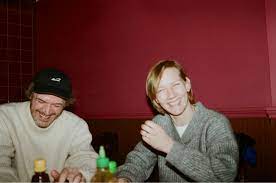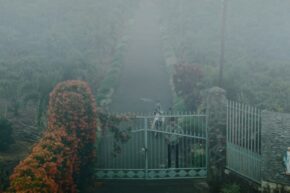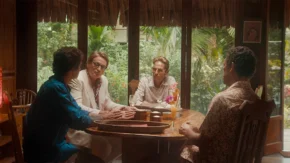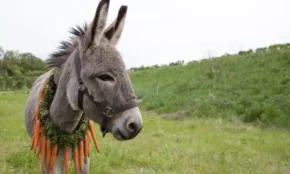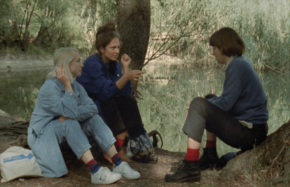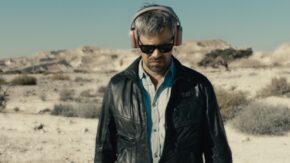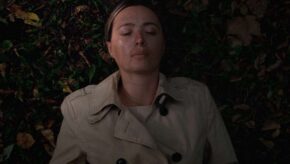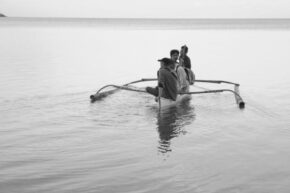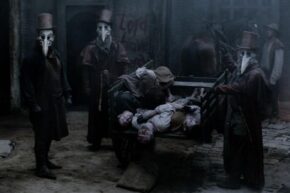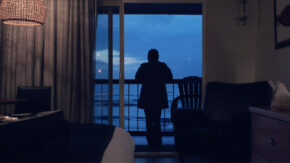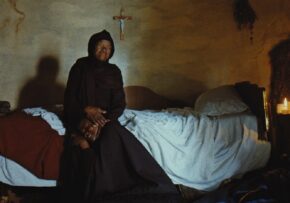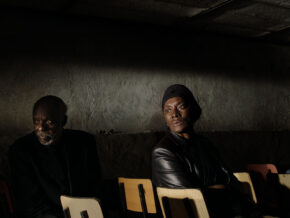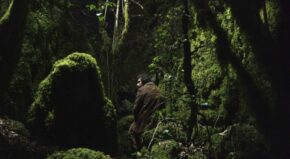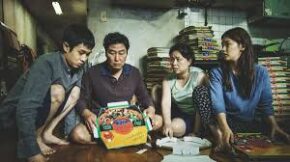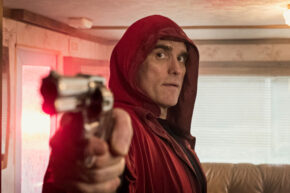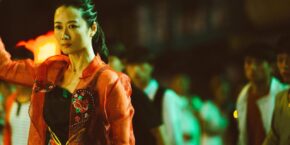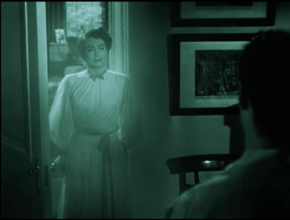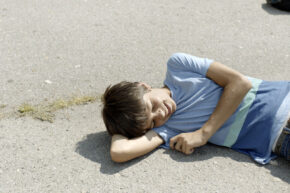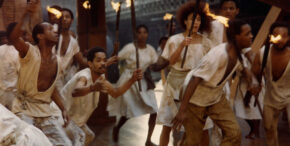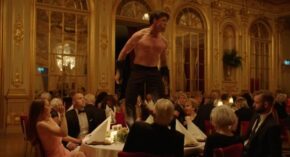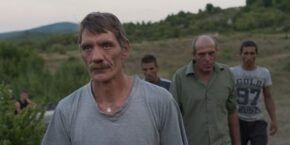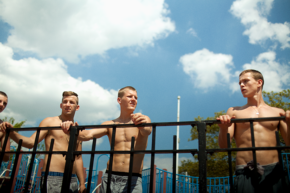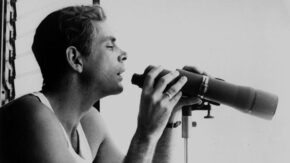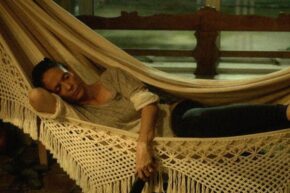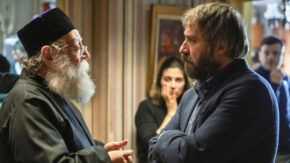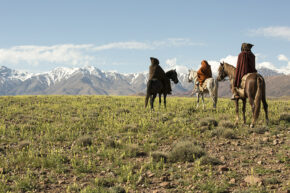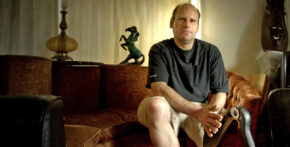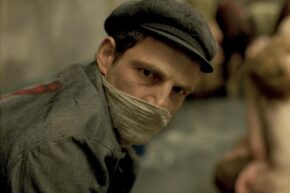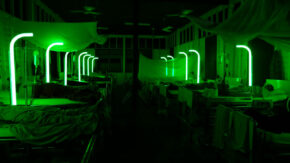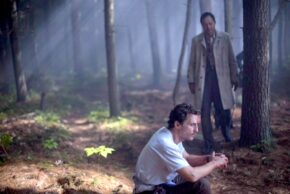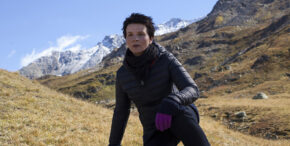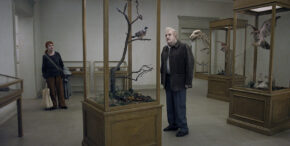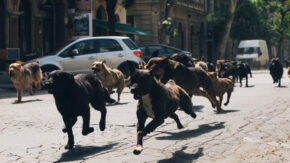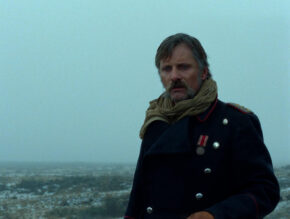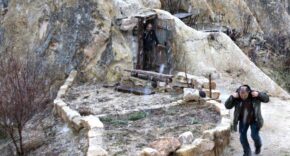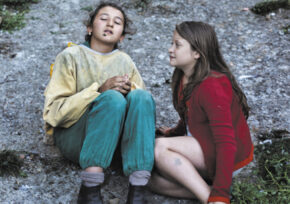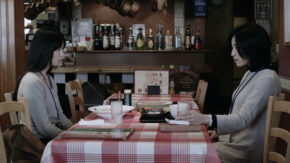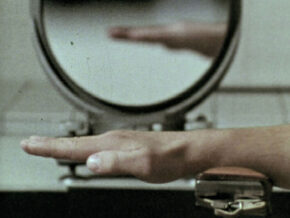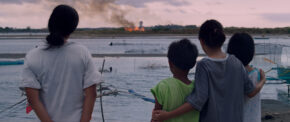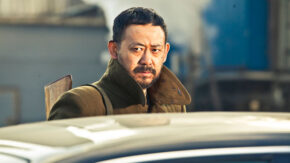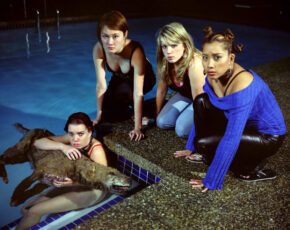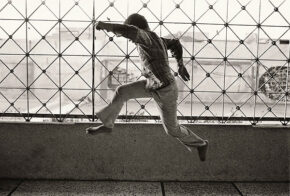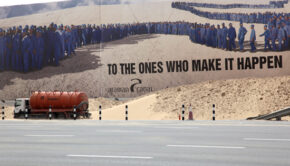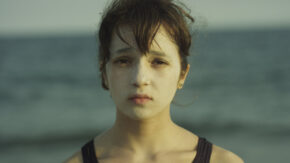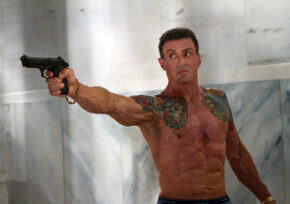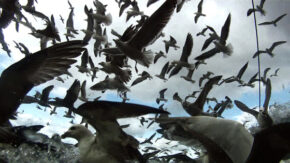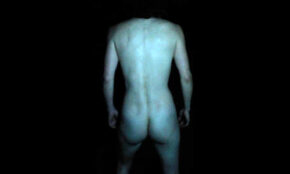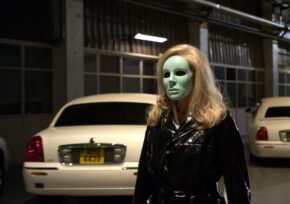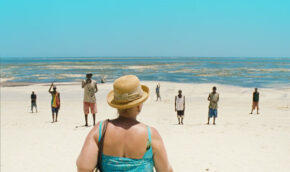Festivals
The Dream’s Dream: Lisandro Alonso on “Eureka”
By Dennis Lim | 06/20/2023 | CS95, Festivals, From Cinema Scope Magazine, Interviews, Spotlight
I write this open letter with profound frustration and disappointment over the programming decisions made for this year’s Cannes. As a filmmaker who has poured my heart and soul into creating thought-provoking and artistically daring works, I cannot help but express my vehement opposition to the relegation of my film, Eureka to the Cannes Première section.
Read More → Close Your Eyes (Víctor Erice, Spain)
By Lawrence Garcia | 06/20/2023 | CS95, Festivals, From Cinema Scope Magazine
The Cannes Première of Close Your Eyes, Víctor Erice’s first feature since Dream of Light (1992) over three decades ago, was immediately followed by a minor controversy. Conspicuously absent from the film’s screening, Erice published an open letter at El País explaining his reasons for boycotting the festival, namely, a marked lack of communication—and an implicit lack of respect—from Thierry Frémaux and his programming team regarding his film’s inclusion in the Official Selection, not in Competition.
Read More → Anatomie d’un chute (Justine Triet, France)
By Aurelie Godet | 06/20/2023 | CS95, Festivals, From Cinema Scope Magazine, Spotlight
Anatomie d’un chute is her fourth feature, and, like all of her work, it shows a keen interest in the chaos of interwoven movements both toward and away from others that humans somehow revel in testing and rearranging, as if unable to figure out the big picture—and in spite of the confusion they keep inflicting on themselves. Never before, though, has Triet displayed such analytical rigour in laying out the ramifications of her premise and reassembling them in a harmonious exposé.
Read More → Inside the Yellow Cocoon Shell (Pham Thien An, Vietnam/Singapore/France/Spain)
By Robert Koehler | 06/20/2023 | CS95, Festivals, From Cinema Scope Magazine, Spotlight
Cinema has always had to defend itself against the pressures of business and capital, and yet, because filmmaking remains expensive (contrary to the false digital fantasies of “cheap” cameras), it is business and capital that continues to keep cinema going. This contradiction of conditions deepens when the filmmaking takes place in a communist-governed nation like Vietnam, where capital operates (albeit sometimes uneasily) within a state-run system.
Read More → The Girl and Her Trust: Sean Price Williams on “The Sweet East”
By Adam Nayman | 06/20/2023 | CS95, Festivals, From Cinema Scope Magazine, Interviews, Spotlight
For some critics and film-cultural commentators, The Sweet East arrives to the Quinzaine smelling of something pungent: its credits list as an executive producer one Jimmy Kaltreider, as per Politico a top aide to Peter Thiel, who himself once upon a time helped another gifted, up-and-coming director make his own politically ambivalent feature debut (Thank You For Nothing, Peter). As Williams says below, treating The Sweet East like a kind of ground zero for right-wing patronage in the history of American cinema—independent or otherwise—is selective and ahistorical to say the least, but the strident liberal-baiting on display still warrants comment.
Read More → Festivals | Berlin: Claire Simon’s Notre corps
By Beatrice Loayza | 03/24/2023 | CS94, Festivals, From Cinema Scope Magazine
Claire Simon’s Notre corps—which captures the visitations and procedures in the gynecological ward of Paris’s Tenon hospital, a public institution located a few blocks from Père Lachaise—understands this compromise, but offers a rebuttal as well: it honours the body’s possibilities and delicate particularities by expanding that gaze to encompass the lives beyond the bodies, the unique frictions engendered by supposedly objective methods.
Read More → The Natives Are Restless: Cannes’ Diamond Jubilee and Albert Serra’s “Pacifiction”
By Mark Peranson | 06/21/2022 | CS91, Festivals, From Cinema Scope Magazine, Spotlight
By Mark Peranson The 75th anniversary celebration of Cannes was very much a “celebration of cinema,” a my-God-it’s-full-of-stars-studded affair intended as a show of power that, rightly, would make any other such movie-based event jealous. As witnessed by its anniversary trailer, which added (seemingly via Photoshop) the names of Cannes-branded auteurs like Federico Fellini, Xavier…
Read More → Stars at Noon (Claire Denis, France)
By Giovanni Marchini Camia | 06/21/2022 | CS91, Festivals, From Cinema Scope Magazine, Spotlight
After waiting 34 years to return to the Cannes Competition, Claire Denis deserved a warm welcome back. Instead, she got to be the chosen victim of the Brown Bunny Syndrome, the annually recurring compulsion among festival attendees to proclaim a film as the worst ever to compete for the Palme d’Or. Although she received some vindication from the jury, who awarded her the Grand Prix (ex aequo, but still…), the critical vitriol is baffling.
Read More → EO (Jerzy Skolimowski, Poland/Italy)
By Jordan Cronk | 06/21/2022 | CS91, Festivals, From Cinema Scope Magazine, Spotlight
When Jerzy Skolimowski cancelled his press commitments at Cannes to promote his new feature, EO, he denied critics and cinephiles an explanation behind the festival’s most mystifying entry. All but engineered to prompt bemusement, the film, a bold, modern-day reimagining of Bresson’s Au hasard Balthazar (1966),is one whose mysteries are in fact part and parcel of its allure.
Read More → Festivals: Berlin | A Little Love Package (Gastón Solnicki, Austria/Argentina)
By Celluloid Liberation Front | 03/21/2022 | CS90, Festivals, From Cinema Scope Magazine
What was until very recently relegated to the safe and spectacular distance of the big screen is now getting uncomfortably closer to the comfortable lives of those who would have never thought to endure, in their lifetimes at least, pandemics, war, and misery. Solnicki’s film is not so much an antidote to this new, creeping reality, but to the loss of sensitivity upon which it is premised.
Read More → Festivals: Sundance | Spaceship Down
By Robert Koehler | 03/21/2022 | CS90, Festivals, From Cinema Scope Magazine
Sundance is the only major film festival in at least North America, and quite possibly the world, to create a section dedicated to the experimental/avant-garde and then turn around and destroy that section’s mission. The section is called New Frontiers, which used to be Sundance’s safe harbour for experimentation and, even if on rare occasions, non-narrative work. That was before the invasion of VR, which now has a near-monopoly on the section.
Read More → Festivals: Berlin | A Flower in the Mouth (Éric Baudelaire, South Korea/France/Germany)
By Deragh Campbell | 03/21/2022 | CS90, Festivals, From Cinema Scope Magazine
Screening in this year’s Berlinale Forum, Éric Baudelaire's unique take on Luigi Pirandello’s 1923 short play The Man with the Flower in His Mouth assumes the form of a diptych: the first part is an observational documentary of Bloemenveiling Aalsmeer, the world’s largest flower market in the Netherlands; the second, a fictional, more explicit adaptation of Pirandello’s text, a conversation taking place over an evening in a Paris bar.
Read More → El Gran Movimiento (Kiro Russo, Bolivia/France/Qatar/Switzerland)
By Jay Kuehner | 01/04/2022 | CS89, Fall Festival Spotlight, Festivals, From Cinema Scope Magazine, Spotlight
By Jay Kuehner The tacit assumption of the “city symphony” is of a metropolis invariably harmonious, conducive to and cooperative with the machinations of both camera and director, the coalescence of an industrial apparatus. Kiro Russo’s native La Paz defies any such arrangement in El Gran Movimiento, which channels the inherent dissonance and manifest disparity…
Read More → A Night of Knowing Nothing (Payal Kapadia, India/France)
By Erika Balsom | 01/04/2022 | CS89, Fall Festival Spotlight, Festivals, From Cinema Scope Magazine, Spotlight
The sleep of reason produces monsters—or so said Francisco Goya, who used the phrase as the title of an aquatint published in 1799. The words appear as if etched into the side of a desk, atop of which a male figure slumps in slumber. From behind him, the menace comes: bats, owls, and cats emerge from the darkness with petrifying gazes, crowding around the man.
Read More → Outside Noise (Ted Fendt, Germany/South Korea/Austria)
By Lawrence Garcia | 01/04/2022 | CS89, Fall Festival Spotlight, Festivals, From Cinema Scope Magazine, Spotlight
In 1984, the American philosopher and art critic Arthur C. Danto articulated a theory of the end of art. His claim—entirely distinct from declarations of the death of art—was not that art would no longer continue to be produced, but rather that there was no longer any “special way works of art have to be.”
Read More → The Tsugua Diaries (Maureen Fazendeiro and Miguel Gomes, Portugal)
By Robert Koehler | 09/20/2021 | CS88, Festivals, From Cinema Scope Magazine, Spotlight
2020 may go down as The Year From Hell, but at least it gave us The Tsugua Diaries. Rudely interrupted by the COVID pandemic in proceeding with not one, but two productions—Savagery and Grand Tour—Maureen Fazendeiro and Miguel Gomes opted to do exactly the opposite of what everyone, including undoubtedly the Portuguese Film Commission, expected: they went and made a movie, deciding, just like the NBA, to create a bubble environment (at a farmhouse compound near the Atlantic coast) and hope for the best.
Read More → France (Bruno Dumont, France)
By Lawrence Garcia | 09/20/2021 | CS88, Festivals, From Cinema Scope Magazine, Spotlight
the seven years since P’tit Quinquin, it has become impossible to continue tagging Bruno Dumont with the longstanding clichés of Bresson criticism. Epithets like “ascetic,” “severe,” “punishing”—already limited descriptors of his first two works, La vie de Jésus (1997) and L’humanité (1999)—have only become more obviously incapable of describing Dumont’s recent films, from the carnivalesque contortions of Ma Loute (2016) to the musical extremes of his Jeanne d’Arc movies.
Read More → Ahed’s Knee (Nadav Lapid, France/Israel/Germany)
By James Lattimer | 09/20/2021 | CS88, Festivals, From Cinema Scope Magazine, Spotlight
might leave a bigger scar. The Kindergarten Teacher (2014) and Synonyms (2019) already flirted with autobiography, but his fourth feature pushes forward into full autofiction, sending a director named Y. (Avshalom Pollak) to the Arava desert for a screening of one of his films, only to discover that open discussion of its content is frowned upon.
Read More → Titane (Julie Ducournau, France/Belgium)
By Phil Coldiron | 09/20/2021 | CS88, Festivals, From Cinema Scope Magazine, Spotlight
The erotic history of the car in cinema extends back nearly to the dawn of the medium: there’s Chaplin, in 1914, asserting in his first film that he’s a more enticing view than the soapbox derbies at the Kid Auto Races (no engines yet).
Read More → Cannes 2021: L’empire contre attack
By Mark Peranson | 09/20/2021 | CS88, Festivals, From Cinema Scope Magazine, Spotlight
France this past July, the answer is a resounding “no.” And thankfully it was a sweltering summer, for if an event like the one Cannes mounted was to take place mostly with indoor dining, the film world would see numbers the size of Florida.
Read More → Exploded View | Suzan Pitt
By Chuck Stephens | 09/20/2021 | CS88, Exploded View, Festivals, From Cinema Scope Magazine
Suzan Pitt’s Asparagus took four. A handcrafted surrealist masterpiece and in every sense a labour of l’amour fou, the extraordinary Asparagus—in a which a femme sans visage takes pleasure in her garden and shares the bounty of her unearthly delights with a mesmerized audience, all before performing fellatio on an alchemical assortment of possibilities—was animated and assembled between 1974 and 1978.
Read More → Sundance 2021: In the Year of COVID
By Robert Koehler | 03/25/2021 | CS86, Festivals, From Cinema Scope Magazine, Spotlight
Now that the cinema world was a year into the COVID-19 pandemic, what movies would be done and available? Would anything premiering be worth a damn after sitting on the shelf for nearly 12 months? Were the good movies being held back in the hope that actual festivals would kick back into gear by, oh, late spring? (Hope springs eternal.) That last question was the one that really mattered, one that pestered the fall festivals of 2020 to a degree but which has now come down hard on festivals in early 2021, as the feeling (is it just a feeling?) grows that the pandemic is coming to the beginning of the end.
Read More → Beginning (Dea Kulumbegashvili, Georgia/France)
By Lawrence Garcia | 12/22/2020 | CS85, Fall Festival Spotlight, Festivals, From Cinema Scope Magazine
By Lawrence Garcia Beginning opens with a sermon on the Old Testament tale of Abraham and Isaac, delivered to a Jehovah’s Witness congregation in Georgia’s predominantly Orthodox Christian Caucasus region. Just as the preacher, David (Rati Oneli), starts to expound on its implications regarding belief, the Kingdom Hall is firebombed by unseen attackers, transforming the…
Read More → The Calming (Song Fang, China)
By Courtney Duckworth | 12/22/2020 | CS85, Fall Festival Spotlight, Festivals, From Cinema Scope Magazine
By Courtney Duckworth Inertia implies stillness, but more precisely it means that without intervention any body resists change. The word conjures ceaseless motion as much as it does stasis—someone who cannot go on, or someone who can do nothing else. Something of this semantic tension imbues The Calming, writer-director Song Fang’s ascetic second feature. Lin…
Read More → Genus Pan (Lav Diaz, Philippines)
By Jesse Cumming | 12/22/2020 | CS85, Fall Festival Spotlight, Festivals, From Cinema Scope Magazine
By Jesse Cumming Marking Lav Diaz’s return to Venice four years and two features after winning the Golden Lion for the nearly four-hour The Woman Who Left, Genus Pan has invited easy jokes about its relative brevity by Diaz standards, clocking in as it does at a relatively efficient 156 minutes—even though it is, in fact,…
Read More → There Are Not Thirty-Six Ways of Showing a Man Getting on a Horse (Nicolás Zukerfeld, Argentina)
By Devika Girish | 12/22/2020 | CS85, Fall Festival Spotlight, Festivals, From Cinema Scope Magazine, Uncategorized
By Devika Girish The films of Nicolás Zukerfeld pit images against words, staging wily games of onscreen meaning-making. Literary miscellanea often spur the ambulatory narratives of the Argentine director’s works: a mysterious letter opens into two Rashomon-esque views of a street encounter in the short La distancia entre las cosas (2008); annotated articles and battered…
Read More → Festivals | Fantasia 2020: Unexpected Pleasures
By Katherine Connell | 09/22/2020 | Festivals, Web Only
By Katherine Connell A maze is designed to puzzle and possibly frustrate; conversely, the pleasure of a labyrinth is in submitting oneself to a route that, when traversed, might reveal the mind of its designer. This is certainly true of the late Obayashi Nobuhiko’s Labyrinth of Cinema (2019), one of the headlining films of Montréal’s…
Read More → Cross Purposes: The 2020 Crossroads Festival
By Michael Sicinski | 09/05/2020 | Cinema Scope Online, Festivals
By Michael Sicinski “When you come to a fork in the road, take it.”—Yogi Berra In an ordinary year, the Crossroads Festival, presented by the San Francisco Cinematheque, provides a kind of alternative to other showcases of experimental film and video that, for various historical or institutional reasons, can be less catholic and more risk-averse.…
Read More → There Can Be a Better World: The 2020 Images Festival
By Cayley James | 06/23/2020 | CS83, Festivals, From Cinema Scope Magazine, Web Only
In Toronto, where film festivals have become something of a cottage industry (with over 150 operating on an annual basis), it’s particularly hard not to feel the cruel irony of the present moment. Festivals remain one of the last holdouts for appreciating films in a public setting in the face of the steady march of streaming and VOD; now, they are faced with the stark choice of either postponing their events entirely, or, as with Images, pivoting to an online model that strikes at their very raison d’être.
Read More → Sundance: Power and Fear in Park City
By Robert Koehler | 03/20/2020 | Columns, CS82, Festivals, From Cinema Scope Magazine
Sundance equals power, and for a good reason: get your movie into the lineup, and you have an excellent chance of securing distribution in the US, a better chance by far than at any other festival. This means that it’s the supreme gateway, and despite or because of this fact, Sundance’s audiences are among the most conservative and rearguard in the international festival world.
Read More → Cinema Scope 80: Editor’s Note
By Mark Peranson | 09/23/2019 | Columns, CS80, Currency, Festivals
Having been in Locarno at the premiere of Vitalina Varela, I can testify that every single one of the 3,000 people who remained in the Fevi for the duration of the film were overwhelmed by the power Costa’s vision, and leapt to their collective feet in standing ovation as the credits rolled. That’s just as believable a scenario as, say, a cadre of radical critics and programmers imposing their beliefs on a bunch of uneducated suckers by sheer will, which is essentially what the Variety argument implies—a bunch of suckers, mind you, that includes a jury of rather experienced filmmakers, watchers, and actors, all of whom as far as I can tell are sentient beings with brain stems unconnected to the cinephile Matrix.
Read More → And That’s Exactly How it Was: The 72nd Locarno Film Festival
By James Lattimer | 09/23/2019 | Columns, CS80, Festivals, From Cinema Scope Magazine, Spotlight
The 72nd edition of the Locarno Film Festival—the first under the artistic direction of Lili Hinstin—was notable for the strength of its documentary offerings, albeit hardly in the conventional sense. Within a solid line-up whose names and general tone didn’t deviate all that much from recent years, the films that stood out most were the ones that tapped into the realm of nonfiction—which isn’t to say they were necessarily documentaries.
Read More → Jeanne (Bruno Dumont, France)
By Blake Williams | 06/27/2019 | CS79, Festivals, From Cinema Scope Magazine, Spotlight
I’ve exited the last several Bruno Dumont films wondering—only somewhat in jest—whether or not their maker had gone completely insane. Until 2014, Dumont was notorious for his straight-faced, neo-Bressonian, severely severe dramas that interrogated the intersection of spiritualism and material form.
Read More → Parasite (Bong Joon Ho, South Korea)
By Adam Cook | 06/24/2019 | CS79, Festivals, From Cinema Scope Magazine, Spotlight
Precisely a decade after his last film shot and produced in South Korea, Bong Joon Ho returns to a place that feels both familiar and unfamiliar with his Palme d’Or-crowned Parasite. Moving beyond the ambitious, overly conceptual, and uneven international co-productions Snowpiercer and Okja, Parasite feels like a movie that only could have been made after such an awkward foray into globalized filmmaking.
Read More → Festivals: Rotterdam | Anchors Aweigh: Zhu Shengze’s Present.Perfect.
By Jesse Cumming | 03/26/2019 | Columns, CS78, Festivals, From Cinema Scope Magazine
In 2014, the Chinese government first outlined its plans for a “social credit system,” a massive project that utilizes various data-collection tools to rank the good standing of the country’s citizens, set to be fully implemented by 2020.
Read More → Festivals | Doclisboa 2018: A Scream into the Void
By Christopher Small | 01/02/2019 | CS77, Festivals, Web Only
By Christopher Small Almost anyone who has spent a prolonged period at a film festival understands the soothing familiarity of a good pre-movie festival spot, those throwaway bits of business that bleary-eyed delegates sit through upwards of 40 times over the course of a week. Everybody reading this doubtless has their favourites; my sense is…
Read More → A Land Imagined (Yeo Siew Hua, Singapore/France/Netherlands)
By Lawrence Garcia | 01/02/2019 | CS77, Fall Festival Spotlight, Festivals, From Cinema Scope Magazine, Spotlight
By Lawrence Garcia About 20 minutes into A Land Imagined, the nominal protagonist, Detective Lok (Peter Yu), tells his partner of how, on his travels to various locales, he realized that he’d been to all of them before—in his dreams. “The strange thing is, I never saw those places as a child. How is this?”…
Read More → Festivals | RIDM 2019: Adapt or Die
By Justine Smith | 12/21/2018 | CS77, Festivals, Web Only
By Justine Smith The world is in turmoil, and at this year’s Recontres Internationales du Documentaire de Montréal, documentaries from around the world grappled with our new reality. Drawing from a wide range of experiences and approaching the idea of non-fiction from an array of perspectives, the films showed a diverse programming mandate; meanwhile the…
Read More → Shoplifters (Kore-eda Hirokazu, Japan)
By Mallory Andrews | 07/02/2018 | CS75, Festivals, From Cinema Scope Magazine, Spotlight
By Mallory Andrews There was a distinct feeling in the air at this year’s Cannes that the Competition jury was under far more scrutiny than usual. The Cate Blanchett-led, female-majority group illustrated a gesture by the festival towards gender equity and a commitment to making structural changes in one of the industry’s most prestigious institutions.…
Read More → Cannes 2018: The Debussy Cramp
By Mark Peranson | 07/02/2018 | CS75, Festivals, From Cinema Scope Magazine, Spotlight
By Mark Peranson Like all Cannes film festivals, the 71st began brightly for this correspondent with the highest of hopes and expectations—and by that of course I am referring to Paulo Branco’s lawsuit against the Festival de Cannes to block the closing-night screening of Terry Gilliam’s The Man Who Killed Don Quixote. Say what you…
Read More → Ash Is Purest White (Jia Zhangke, China/France/Japan)
By James Lattimer | 07/02/2018 | CS75, Festivals, From Cinema Scope Magazine, Spotlight
By James Lattimer It speaks to the richness of Jia Zhangke’s oeuvre that Ash Is Purest White already feels like a career summation, even though the Chinese director has yet to turn 50. Transition has always been at the heart of Jia’s work, but this, his twelfth feature-length film, explores the theme across three carefully…
Read More → Happy as Lazzaro (Alice Rohrwacher, Italy/Switzerland/France/Germany)
By Celluloid Liberation Front | 07/02/2018 | CS75, Festivals, From Cinema Scope Magazine, Spotlight
By Celluloid Liberation Front Far removed from any realistic pretence and yet intimately connected to the ineluctability of the present and the obstinacy of the past, Alice Rohrwacher’s latest film unfolds in a state of fantastical rarefaction. No longer bound to the earthly naturalism of her previous two features, Rohrwacher seems to have found in…
Read More → Inbetweeners: The 2018 Images Festival
By Michael Sicinski | 04/23/2018 | Cinema Scope Online, Festivals
By Michael Sicinski If you happen to frequent experimental film festivals (and, if you’re reading this, there’s a better-than-average chance that you do), you know that each of them has its own unique ambiance. Part of it, of course, has to do with the types of films shown, which in turn affects the community of…
Read More → Sundance 2018: What’s the Story?
By Robert Koehler | 03/16/2018 | CS74, Festivals, From Cinema Scope Magazine
By Robert Koehler In Park City this January, all of those attending the Sundance Film Festival were told in no uncertain terms on a daily, if not hourly, basis that “the story lives in you.” The statement was right there on the cover of the catalogue, so dominant that it replaced the words—“Sundance Film Festival”—that…
Read More → The Green Fog (Guy Maddin, Evan Johnson, Galen Johnson, US/Canada)
By Lawrence Garcia | 12/19/2017 | CS73, Fall Festival Spotlight, Festivals, From Cinema Scope Magazine, Spotlight
By Lawrence Garcia That Guy Maddin’s feature-length follow-up to his most monumental work to date—the staggering mise en abyme of The Forbidden Room (2013)—would be The Green Fog, a 63-minute, found-footage video reimagining of Alfred Hitchcock’s Vertigo (1958), is entirely apropos (and a rather Maddin-esque sleight-of-hand) when one considers the fanfare with which The Green…
Read More → 3/4 (Ilian Metev, Bulgaria/Germany)
By Jordan Cronk | 12/19/2017 | CS73, Festivals, From Cinema Scope Magazine, Spotlight
By Jordan Cronk A modest work of considerable grace and insight, Ilian Metev’s 3/4 quietly stands as one of the most accomplished narrative debuts of the year. Genuinely compassionate, the 36-year-old Bulgarian’s directorial voice echoes forth confidently from the opening frames of this most understated of family dramas. Following the Semaine de la Critique fêted…
Read More → Secrets: Il Cinema Ritrovato 2017
By Christopher Small | 07/20/2017 | Cinema Scope Online, Festivals
By Christopher Small Pondering some of the most memorable events of my fourth visit to Bologna’s Il Cinema Ritrovato, I find myself embarrassingly drawn to some of the most slavish metaphors of film criticism: film as a magician’s art, the cinema as a séance, and “the magic of movies.” Self-induced nausea aside, this lingering metaphor…
Read More → The Square (Ruben Östlund, Denmark/France/Germany/Sweden)
By Josh Cabrita | 06/23/2017 | CS71, Festivals, From Cinema Scope Magazine, Spotlight
By Josh Cabrita A secular credo patchworked from the Golden Rule and the Universal Declaration of Human Rights is engraved on an altar: “The Square is a sanctuary of trust and caring. Within it we all share equal rights and obligations.” Before it was a two-hour and 20-minute Palme d’Or winner, The Square was born…
Read More → An Element of Danger: Josh and Benny Safdie on Good Time
By Dan Sullivan | 06/23/2017 | Festivals, Spotlight, Web Only
By Dan Sullivan Cinema Scope: Good Time has a propulsive feeling of forward momentum, a kind of punchiness, which was also present in flashes in Heaven Knows What (2014). Your work has always been marked by a chaotic energy—but here it’s so consistent and sustained. Was that always the idea for the film, and how…
Read More → Cannes at 70: Bad Times, Good Time
By Mark Peranson | 06/23/2017 | Columns, CS71, Festivals, From Cinema Scope Magazine, Spotlight
By Mark Peranson To celebrate its 70th anniversary, Cannes aggressively, yet clumsily, inserted itself into all kinds of contemporary debates over that age-old question: What is Cinema? The first answer to this question: the cinema is Cannes. On the organizational side, this was evident in the reworking of the festival trailer that runs prior to…
Read More → The Day After / Claire’s Camera (Hong Sangsoo, South Korea)
By Andrea Picard | 06/22/2017 | Columns, CS71, Festivals, From Cinema Scope Magazine, Spotlight
By Andréa Picard With its wonderful Whitman-inspired title, On the Beach at Night Alone gave us one of the year’s most indelible images, so crushing, mournful, and beautiful in its abandon: Kim Minhee’s character Younghee lying forlorn in the sand on a cold beach. The solemn distress and physical destitution occasioned by Liebeskummer was palpable…
Read More → At the Frontier: Valeska Grisebach on Western
By James Lattimer | 06/22/2017 | Columns, CS71, Festivals, From Cinema Scope Magazine, Spotlight
By James Lattimer Why would anyone claim to be something they’re not? For Meinhard (Meinhard Neumann), the protagonist of German director Valeska Grisebach’s long-anticipated third feature, it’s a way to get himself out of a scrape. Wedged in a car at night with a group of people he can’t understand, Meinhard declares that he was…
Read More → Jeannette, l’enfance de Jeanne d’Arc (Bruno Dumont, France)
By Jordan Cronk | 06/22/2017 | Columns, CS71, Festivals, From Cinema Scope Magazine, Spotlight
By Jordan Cronk Pitched somewhere between Straub-Huillet and Headbangers Ball, Monty Python and Messiaen, Bruno Dumont’s new feature Jeannette, l’enfance de Jeanne d’Arc marks an unexpected and near-perfect synthesis of the French iconoclast’s many disparate interests and obsessions. Although by now it’s convenient to read Dumont’s robust corpus through the categorical extremes of his early,…
Read More → 24 Frames (Abbas Kiarostami, Iran)
By Blake Williams | 06/22/2017 | CS71, Festivals, From Cinema Scope Magazine, Spotlight
By Blake Williams The first segment of Abbas Kiarostami’s final, posthumously completed video piece, 24 Frames, is a simple rendering of Pieter Bruegel the Elder’s 1565 painting The Hunters in the Snow. Staring, for a Cageian four-and-a-half minutes, at the familiar wintery scene—its composition exemplary of the Dutch master’s decentred, multitiered narrative designs—we witness Kiarostami’s…
Read More → Berlin: Bright Nights and Non-Events
By Jordan Cronk | 03/24/2017 | Columns, CS70, Festivals, From Cinema Scope Magazine
Arriving like a breath of fresh air five days into the 67th Berlinale, Thomas Arslan’s Bright Nights salvaged what was by all accounts was another typically lacklustre Competition lineup.
Read More → Sundance (II): A Few Useful Details
By Jay Kuehner | 03/24/2017 | Columns, CS70, Festivals, From Cinema Scope Magazine
By Jay Kuehner At a Q&A after a well-received screening of Eliza Hittman’s film Beach Rats, which earned her the Directing Award in the US Dramatic competition, the Cal Arts grad spoke of the aesthetic need to “de-emphasize story”—an admission that, in the context of Sundance’s high priority for narrative takeaways, might well have constituted…
Read More → Ceux qui font les révolutions à moitié n’ont fait que se creuser un tombeau (Mathieu Denis and Simon Lavoie, Canada)
By Adam Nayman | 12/19/2016 | CS69, Fall Festival Spotlight, Festivals, From Cinema Scope Magazine, Spotlight
By Adam Nayman How in the world did Ceux qui font les révolutions à moitié n’ont fait que se creuser un tombeau (Those Who Make Revolution Halfway Only Dig Their Own Graves) win the Best Canadian Feature prize this year at TIFF? I’m wondering this not because I think the film is unworthy, or necessarily…
Read More → Austerlitz (Sergei Loznitsa, Germany)
By Jay Kuehner | 12/19/2016 | CS69, Fall Festival Spotlight, Festivals, From Cinema Scope Magazine, Spotlight
By Jay Kuehner If poetry after Auschwitz constituted an act of barbarism, then what can be made of curious tourists eating sandwiches, or snapping self-portraits, on the lawns of former concentration camps now repurposed as museums? The question isn’t so much posed as interrogatively embedded in Austerlitz’s conceptual framework, in which “dark tourism” is subjected…
Read More → Locarno (I): Challenges
By Jay Kuehner | 09/26/2016 | Columns, CS68, Festivals, From Cinema Scope Magazine
By Jay Kuehner With its boldly stylized design, looking otherworldly but extracted from the all-too-real, and replete with excess—not least a purring pet cheetah lounging on ornate carpet and riding in a luxury sports car, and a brotherhood of Muslim bikers astride sparkling choppers—The Challenge could double as a wayward film-festival advert. Yuri Ancarani’s Filmmakers…
Read More → A Dionysian Vision: Il Cinema Ritrovato XXX
By Celluloid Liberation Front | 08/16/2016 | Cinema Scope Online, Festivals
By Celluloid Liberation Front “Whereas the dream is thus the individual human’s play with what is actual, the art of the image-maker (in the broader sense) is play with the dream.”—Friedrich Nietzsche, The Dionysian Vision of the World Now in its 30th edition, the second after the physical and artistic departure of the late Peter…
Read More → La mort de Louis XIV (Albert Serra, France/Spain/Portugal)
By Blake Williams | 06/27/2016 | CS67, Festivals, From Cinema Scope Magazine, Spotlight
By Blake Williams With birds singing above, a 71-year-old Jean-Pierre Léaud sits dressed as the 76-year-old Sun King, pale and powdered under his big wig, nobly stationed amid a twilit rose garden in his wheelchair, finally bidding to his two eager valets: “Onward.” Thus begins Albert Serra’s fifth and most classically beautiful feature, La mort…
Read More → Termite Art: Kleber Mendonça Filho on Aquarius
By Robert Koehler | 06/27/2016 | CS67, Festivals, From Cinema Scope Magazine, Spotlight
By Robert Koehler The Year of Trump now has its movie. In Kleber Mendonça Filho’s second feature Aquarius, a property developer tries to force the last resident to move out of an old but hardly decrepit apartment building on a prime beachside lot. The tenant is Clara (Sonia Braga), a respected 65-year-old music critic and…
Read More → Sieranevada (Cristi Puiu, Romania/France/Bosnia and Herzegovnia/Croatia/Republic of Macedonia)
By Jordan Cronk | 06/27/2016 | CS67, Festivals, From Cinema Scope Magazine, Spotlight
By Jordan Cronk At the dawn of the decade, a brief break appeared in the first wave of New Romanian Cinema. Though of similar historic and cinematic concern, a number of the films produced during this period—including Corneliu Porumboiu’s The Second Game (2013), Cristi Puiu’s Three Interpretation Exercises (2012), and The Autobiography of Nicolae Ceausescu…
Read More → A Battle of Humour: Maren Ade on Toni Erdmann
By Mark Peranson | 06/27/2016 | CS67, Festivals, From Cinema Scope Magazine, Spotlight
By Mark Peranson Cinema Scope: Everyone Else premiered in Berlin in 2009, and now seven years later your third film is finally receiving its debut in Cannes. What took so long? Maren Ade: Directly after Everyone Else, I started working as a producer. I have a company called Komplitzen Film with Janine Jackowski and Jonas…
Read More → Cannes 2016: Gentlemen, We’ll Do Better Next Time
By Mark Peranson | 06/27/2016 | CS67, Festivals, From Cinema Scope Magazine, Spotlight
By Mark Peranson “Messieurs, nous ferons mieux la prochaine fois.”—Fagon, Le mort de Louis XIV The already established conventional wisdom is that 2016 saw a strong Cannes Competition ruined by a set of awful awards from a dunderheaded jury of circus clowns led by third-time’s-a-charm George Miller—and while I certainly agree with the latter contention,…
Read More → Mimosas (Oliver Laxe, Spain/Morocco/Qatar/France)
By Jay Kuehner | 06/27/2016 | CS67, Festivals, From Cinema Scope Magazine, Spotlight
By Jay Kuehner A Sufi western? In the parole of Cannes’ critical taxonomy, the designation bestowed upon Oliver Laxe’s desert-fevered, Semaine de la Critique-winning allegory would seem reductive if it didn’t allude, paradoxically, to the film’s radically expansive nature. This leads one to wonder just what “a Sufi western” might look like, or how it…
Read More → Betting on Half-Time: The 62nd International Short Film Festival Oberhausen
By Christoph Huber | 05/27/2016 | Cinema Scope Online, Festivals
By Christoph Huber Standing in Oberhausen’s Rathausgrill—an authentic local fast food place that epitomizes the city’s dilapidated, um, charm—for a last currywurst mit pommes before catching my plane out midway through the 62nd edition of the Kurzfilmtage Oberhausen, I use the short waiting time to reflect on the three hectic days preceding it: although I…
Read More → A Cinema of the Margins: The Curious Case of Claudio Caligari
By Ruben Demasure | 03/21/2016 | CS66, Festivals, From Cinema Scope Magazine, Spotlight
By Ruben Demasure At this year’s International Film Festival Rotterdam, one of the three directors who received tributes was mostly ignored. Adachi Masao and Pere Portabella were in the spotlight with much-anticipated premieres, while the first international retrospective of Claudio Caligari’s work remained in the shadows—an appropriate fate, as the margin was both Caligari’s subject…
Read More → Happy Hour (Hamaguchi Ryusuke, Japan)
By Michael Sicinski | 12/21/2015 | CS65, Fall Festival Spotlight, Festivals, From Cinema Scope Magazine, Spotlight
By Michael Sicinski It’s a strange film that calls to mind both Out 1 (1971) and Sex and the City. But Hamaguchi Ryusuke’s Happy Hour is defined by that odd tug between spacious, undirected improvisation on the one hand, and an incident-driven examination of the ups and downs of four women friends on the other.…
Read More → Failure Hasn’t Spoiled Him Yet: Alan Zweig Succeeds in Spite of Himself
By Jason Anderson | 12/21/2015 | CS65, Fall Festival Spotlight, Festivals, From Cinema Scope Magazine
By Jason Anderson Alan Zweig’s Hurt is steeped in failures, not all of them belonging to the film’s unholy trainwreck of a subject, Steve Fonyo. In 1984, four years after a similarly valiant effort by Terry Fox that won the hearts and minds of the nation, the 18-year-old cancer survivor from Vernon, B.C. began a…
Read More → The Assassin (Hou Hsiao-hsien, Taiwan)
By Jordan Cronk | 06/23/2015 | CS63, Festivals, From Cinema Scope Magazine, Spotlight
By Jordan Cronk The sounds of silence reverberate loudest in The Assassin, Taiwanese master Hou Hsiao-hsien’s first feature in eight years. The film’s opening image, of a donkey quietly grazing in a field, immediately suggests an acute awareness of natural ambience. This impression manifests itself as the most frequently felt resonance in a work largely…
Read More → Son of Saul (László Nemes, Hungary)
By Richard Porton | 06/23/2015 | CS63, Festivals, From Cinema Scope Magazine, Spotlight
By Richard Porton Dennis Lim’s Artforum dispatch from Cannes pauses briefly to ponder the merits of László Nemes’ Son of Saul and concludes that, either despite or because of Nemes’ “showboating” tendencies, it’s a film that will “spawn a thousand think pieces.” If the ruminations that follow will, I’m afraid, constitute one of the first…
Read More → Cemetery of Splendour (Apichatpong Weerasethakul, UK/France/Germany/Malaysia/Thailand)
By Kong Rithdee | 06/23/2015 | CS63, Festivals, From Cinema Scope Magazine, Spotlight
By Kong Rithdee Midway into Cemetery of Splendour, Jenjira Pongpas visits the Shrine of the Two Goddesses with her American husband to make offerings: she gives the goddesses a cheetah figurine for blessings on her bad leg, a gibbon for her strong limbs, and a tiger for the strength of her new son, Itt, one…
Read More → Sleeping Giant (Andrew Cividino, Canada)
By Jason Anderson | 06/23/2015 | CS63, Festivals, From Cinema Scope Magazine, Spotlight
By Jason Anderson Almost 90 per cent of Canada is uninhabitable. Of those who live in the rest, the overwhelming majority live within 500 miles of the US border. So maybe it’s not so surprising that the nation’s filmmakers—themselves largely clustered in the same few square miles of Toronto, Vancouver and Montreal—regard the hinterlands with…
Read More → Cannes 2015: My God, It’s Full of Stars!
By Mark Peranson | 06/23/2015 | CS63, Festivals, From Cinema Scope Magazine, Spotlight
By Mark Peranson Well, at least the weather was good. Every year another leak threatens to spring in the dam, but the Festival de Cannes is not going to die a death of a thousand, or even a million, cracks. I started to vomit up the Kool-Aid at least a decade ago, and harbour no…
Read More → Italians Abroad: Youth, Mia Madre, Tale of Tales, The Other Side
By Celluloid Liberation Front | 06/23/2015 | CS63, Festivals, From Cinema Scope Magazine, Spotlight
By Celluloid Liberation Front “To support Italian cinema is a crime against humanity.”—Franco Maresco Even more provincial and mediocre than the three Italian films in the Cannes Competition was the reaction of the mainstream media in Italy when they woke up to what they perceived and reported to be an unforgivable affront. None of their…
Read More → No Line on the Horizon: True/False 2015
By Jordan Cronk | 04/01/2015 | Cinema Scope Online, Festivals
By Jordan Cronk Director Albert Maysles passed away on the evening March 5th, the opening night of the 12th annual True/False Film Festival. Many were shocked and all were saddened when news of his death began to circulate the following morning, and his name was understandably on the tip of many people’s tongues throughout the…
Read More → Sundance 2015: Results from the Frontier
By Blake Williams | 03/26/2015 | CS62, Festivals, From Cinema Scope Magazine
By Blake Williams Sundance regulars were generally in agreement that this was a solid year, but not as good as the last. This was my first venture to Park City, but having caught up with nearly all of 2014’s greatest hits, I have to dutifully disagree. In fact, against all odds, with over a…
Read More → Letters to Max (Eric Baudelaire, France)
By Leo Goldsmith | 12/18/2014 | CS61, Festivals, From Cinema Scope Magazine, Spotlight
By Leo Goldsmith “I am writing you this letter from a distant land,” begins Chris Marker’s epistolary essay film-cum-travelogue Letter from Siberia (1957), establishing—from this neo-genre’s very first moments—those elements of distance and dialogue that will come to define the “letter film”: a direct address from an almost alien world, bridging gaps and perspectives through…
Read More → Episode of the Sea (Van Brummelen & De Haan and the inhabitants of Urk, Netherlands)
By Daniel Kasman | 12/18/2014 | CS61, Festivals, From Cinema Scope Magazine, Spotlight
By Daniel Kasman One of the most original films at the Toronto International Film Festival, Lonnie van Brummelen and Siebren de Hann’s ethnographic documentary Episode of the Sea reveals, if not declares, its antecedents immediately. This was not unexpected, since the filmmakers’ previous short in Wavelengths, and one of the best films of 2012, View…
Read More → The Iron Ministry (J.P. Sniadecki, US/China)
By Jordan Cronk | 12/18/2014 | CS61, Festivals, From Cinema Scope Magazine, Spotlight
By Jordan Cronk Issues of transit, dispersion, and the commercial and cultural tides precipitating each successive wave of Chinese migration have preoccupied filmmakers for decades. But as an influx of nonfiction work concerned with such sociological conditions continues to permeate international cinema, it’s clear that the relationship between artistic and industrial progression is anything but…
Read More → Heaven Knows What (Josh & Benny Safdie, US)
By Sean Rogers | 12/18/2014 | CS61, Festivals, From Cinema Scope Magazine, Spotlight
By Sean Rogers The opening sequence of Nicholas Ray’s They Live by Night (1948) depicts the warmly lit faces of soon-to-be lovers Bowie (Farley Granger) and Keechie (Cathy O’Donnell) hovering close to one another, looking to the other for comfort or reciprocation or heaven knows what, while music burbles and swells on the soundtrack. As…
Read More → Clouds of Sils Maria (Olivier Assayas, France/US)
By Andrew Tracy | 12/18/2014 | CS61, Festivals, From Cinema Scope Magazine, Spotlight
By Andrew Tracy “Ingmar Bergman once said that he makes a film with full consciousness that it will be shown on a screen that showed a Western the week before and will show a romance the week following, and that he likes this situation,” wrote the late Stanley Kauffmann in 1981, apropos of Spielberg’s nostalgia-plundering…
Read More → A Pigeon Sat on a Branch Reflecting on Existence (Roy Andersson, Sweden)
By Jason Anderson | 12/18/2014 | CS61, Festivals, From Cinema Scope Magazine, Spotlight
By Jason Anderson Filmmakers have a variety of reasons for enlisting non-professionals for their casts, but often what they seek is a rude, unvarnished vitality that actors can only simulate. Roy Andersson, however, works hard to dull any such spark from his chosen performers. First among his favoured tactics is the makeup that leaves their…
Read More → Karlovy Vary International Film Festival | Escape Artists: Bird People and Locke
By Adam Nayman | 07/11/2014 | Cinema Scope Online, Currency, Festivals
By Adam Nayman A film seemingly made to be screened at film festivals, where its scenes of characters logging into hotel wi-fi on their laptops and thrashing around in the throes of jetlag will pack an affective punch (for journalists, at least), Bird People has divided critics as neatly as its own bifurcated, his-and-hers…
Read More → Cannes 2014: Who Let the Dogs Out?
By Mark Peranson | 06/25/2014 | CS59, Festivals, From Cinema Scope Magazine, Spotlight
...another Cannes film festival whose lineup reads like it could have been cobbled together by a computer programmed with Frémaux DNA...
Read More → Cannes 2014 | Adieu au langage (Jean-Luc Godard, France)
By Blake Williams | 06/25/2014 | CS59, Festivals, From Cinema Scope Magazine, Spotlight, Top Ten Films 2014
By Blake Williams. The first on-screen text in Toutes les histoires (1988), the first chapter of Histoire(s) du cinéma, reads (as translated), “May each eye negotiate for itself.” Presented while Godard pronounces another maxim (“Don’t show every side of things; allow yourself a margin for the indefinite”), this text effectively prepares us for the spectatorial…
Read More → Cannes 2014 | Jauja (Lisandro Alonso, Argentina/Mexico/Denmark/France/Germany/USA/Brazil)
By Quintin | 06/25/2014 | CS59, Festivals, From Cinema Scope Magazine, Spotlight, Top Ten Films 2014
By Quintín After the completion of his “Lonely Men Trilogy” of La libertad (2001), Los muertos (2004), and Liverpool (2008), people started to say that Lisandro Alonso should do something different. Jauja answers that request: it’s a film with an international star (Viggo Mortensen), features characters who speak in full sentences, and boasts a script…
Read More → Cannes 2014 | Winter Sleep (Nuri Bilge Ceylan, Turkey/Germany/France)
By Jordan Cronk | 06/25/2014 | CS59, Festivals, From Cinema Scope Magazine, Spotlight
By Jordan Cronk Seemingly preordained, director Nuri Bilge Ceylan’s overdue Palme d’Or win provided a nonetheless satisfying conclusion to a rather undramatic Cannes film festival—and, further, to a closing awards ceremony of otherwise empty gestures and mostly uninspired selections. A two-time recipient of the Grand Prix for Distant (2002) and Once Upon a Time in…
Read More → Cannes 2014 | The Wonders (Alice Rohrwacher, Italy/Switzerland/Germany)
By Tom Charity | 06/25/2014 | CS59, Festivals, From Cinema Scope Magazine, Spotlight
By Tom Charity For those “in the know,” the Grand Jury Prize accorded to Alice Rohrwacher’s second film was the one surprise on a night where Jane Campion’s jury otherwise played things safe and sure, dispensing awards with dutiful nods to all sides. (Libération described it as the one prize with the flavour of a…
Read More → Cannes 2014 | Saint Laurent (Bertrand Bonello, France)
By Boris Nelepo | 06/25/2014 | CS59, Festivals, From Cinema Scope Magazine, Spotlight
By Boris Nelepo “Names, no doubt, are whimsical draughtsmen, giving us of people as well as of places sketches so unlike the reality that we often experience a kind of stupour when we have before our eyes in place of the imagined, the visible world (which, for that matter, is not the real world, our…
Read More → Digital Images: Images Festival 2014
By Kiva Reardon | 04/18/2014 | Cinema Scope Online, Festivals
By Kiva Reardon Toronto’s Images Festival presents something of a glut of convenience for media in attendance. Offering streaming links to almost their entire programme, the festival can be consumed from a couch, in sporadic order and with no regard for curatorial intent, which beggars the question: Is a collection of Vimeo links really a…
Read More → Festivals | Rotterdam: M for Mellow
By Calum Marsh | 03/20/2014 | CS58, Festivals, From Cinema Scope Magazine, Spotlight
By Calum Marsh Dissonance was in the air in the Rotterdam. There persists, of course, a contradiction at the heart of every international film festival: thousands are asked to converge together in a city so that they may spend their time alone in the dark, which is a bit like wasting a tropical vacation watching…
Read More → Festivals | Berlin: Black Coal, Thin Ice
By Shelly Kraicer | 03/20/2014 | CS58, Festivals, From Cinema Scope Magazine, Spotlight
By Shelly Kraicer There are aspects of present-day Chinese reality so bizarre that only surrealist-tinged genre films can come close to capturing them. In the press kit for the brilliant noir-mystery-arthouse mash-up Black Coal, Thin Ice, which won the Golden Bear in Berlin, director Diao Yinan observes, “There’s a lot going on in China these…
Read More → Festivals | Berlin: The Forma of Things to Come
By Robert Koehler | 03/20/2014 | CS58, Festivals, From Cinema Scope Magazine, Spotlight
By Robert Koehler Amongst the certainties of every large festival, three are more certain than the others. One, every large festival shows many bad movies. Second, no two people (unless they’re attached at the hip) see remotely similar lineups of movies and can’t see enough of them to get the truly big picture on the…
Read More → Approaching the (Baby) Elephant: True/False 2014
By Adam Nayman | 03/06/2014 | Cinema Scope Online, Festivals
ADAM NAYMAN: While still far from elephantine, Columbia, Missouri’s annual True/False festival has grown just large enough to accommodate celebrity buzz—or at least jokey rumors that Soulja Boy was going to show up for the closing-night screening of Boyhood. It’s thus also big enough to have finally attracted a little bit of backlash. To cite one…
Read More → Redemption (Miguel Gomes, Portugal/France/Germany/Italy)
By Max Nelson | 12/13/2013 | CS57, Festivals, From Cinema Scope Magazine, Spotlight
By Max Nelson Miguel Gomes is in a tricky position: three features into his filmmaking career, he’s already developed a remarkably consistent and well-rounded personal style, stretched it to the breaking point, and then whittled it back down. Tabu, Gomes’ 2012 breakout, felt like a triumphant fusion of elements from his previous two features, borrowing…
Read More → Mouton (Gilles Deroo and Marianne Pistone, France)
By Jay Kuehner | 12/13/2013 | CS57, Festivals, From Cinema Scope Magazine, Spotlight
By Jay Kuehner Some mysteries aren’t meant to be solved, and Mouton (no, this isn’t another film about sheep) from first-time directors Gilles Deroo and Marianne Pistone, is the latest in a budding field of beautifully irreducible tales—blessed with the imprimatur of Locarno’s Opera Prima award—that refracts its subject through a prismatic approach to narrative.…
Read More → La jalousie (Philippe Garrel, France)
By Blake Williams | 12/13/2013 | CS57, Festivals, From Cinema Scope Magazine, Spotlight
By Blake Williams At one point in Philippe Garrel’s La jalousie, eight-year-old Charlotte (Olga Milshtein) asks Claudia (Anna Mouglalis), the new girlfriend of her father Louis, whom she thinks her father loves more. Claudia’s answer: “His father.” In one sense, of course, this reply is an evasion of the question Charlotte was actually asking—i.e., “Does…
Read More → Ida (Pawel Pawlikowski, Poland/Denmark)
By Jerry White | 12/13/2013 | CS57, Festivals, From Cinema Scope Magazine, Spotlight
By Jerry White Ida marks Polish filmmaker Pawel Pawlikowski’s first feature film in Polish—the director immigrated to the UK with his parents in the ’70s, and subsequently built his career there—but just what kind of Polish film it is proves a rather tricky question. There are, to be sure, several national-cinema standbys on order: it’s…
Read More → Hard to Be a God (Aleksei German, Russia)
By Olaf Moller | 12/13/2013 | CS57, Festivals, From Cinema Scope Magazine, Spotlight
By Olaf Möller Now it’s been delivered, the last work of the late Aleksei German. On Wednesday, November 13th, 10:30 a.m., during the Festival internazionale del film di Roma, his 14-years-in-the-making Hard to Be a God (Trudno byt’ bogom)—for some time called History of the Arkanar Massacre (Istorija Arkanarskoj rezni)—got its first public screening. It…
Read More → Lustfully Sifting Through the Archives of Cinema: Il Cinema Ritrovato XXVII
By Celluloid Liberation Front | 07/11/2013 | Cinema Scope Online, Festivals
By Celluloid Liberation Front “Variety and multiplicity are the two most powerful vehicles of lust.”—Marquis De Sade Were we to emulate the Biblical terminology Il Cinema Ritrovato employs to describe one of its sections and apply it to the festival experience as a whole, rather than a Paradise the Bologna festival is more like a…
Read More → Cannes 2013 | Histoire(s) de profondeur: 3x3D
By Blake Williams | 06/24/2013 | CS55, Festivals, From Cinema Scope Magazine, Spotlight
By Blake Williams First, bless Charles Tesson for having the balls to acknowledge that experimental cinema exists, no matter that its manifestations at Cannes are still ghettoized to a damp auditorium in the gaudy Miramar hotel, located somewhere around the halfway point to Antibes. The fact that Tesson has spent his two years as artistic…
Read More → Cannes 2013 | Norte, the End of History (Lav Diaz, Philippines)
By Boris Nelepo | 06/24/2013 | CS55, Festivals, From Cinema Scope Magazine, Spotlight
By Boris Nelepo Nothing is true. Morals are dead. There are no more laws. The end of history is nigh. So says Fabian (Sid Lucero), a law-school dropout who sees no point in legislation in a world devoid of reason. Permanently in debt, he whiles away the hours gabbing and griping about the humiliation his…
Read More → Cannes 2013 | Genocide Party Day: Death March, The Missing Picture, The Last of the Unjust
By Christoph Huber | 06/24/2013 | CS55, Festivals, From Cinema Scope Magazine, Spotlight
By Christoph Huber Daily reporters at film festivals dread few demands from otherwise uninterested editors as much as “the festival’s overarching theme”: along with weather reports, these requests crop up with dispiriting regularity. As if a limited selection of movies (circumscribed by all kinds of necessities and strategic manoeuvers, at times more than artistic merit,…
Read More → Cannes 2013 | Only God Forgives (Nicolas Winding Refn, Denmark)
By Kong Rithdee | 06/24/2013 | CS55, Festivals, From Cinema Scope Magazine, Spotlight
By Kong Rithdee Handcuffed to Ryan Gosling in the nightmare that is my home city, let me walk you through the checklist. Elephant: Yes. Eastern mysticism: Yes. Muay Thai: Yes. Monks or monk-like figures: Yes. Nocturnal Bangkok in the claws of neon light, in a lesser-Lynch lurid trance: Yes. Flummoxed foreigners lost in a labyrinth:…
Read More → Cannes 2013 | A Touch of Sin (Jia Zhangke, China)
By Robert Koehler | 06/24/2013 | CS55, Festivals, From Cinema Scope Magazine, Spotlight
By Robert Koehler Jia Zhangke is not an artist who normally trucks in anger. In an era when film criticism and programming have been steadily shifting away from a focus on nationalist tendencies, led by filmmakers who’ve become globalized along with the rest of us, Jia has maintained a steady bead on his native Mainland…
Read More → Cannes 2013 | Lovers in a Dangerous Time: La vie d’Adèle—chapitre 1 & 2, Inside Llewyn Davis, L’inconnu du lac
By Mark Peranson | 06/24/2013 | CS55, Festivals, From Cinema Scope Magazine, Spotlight
By Mark Peranson Yeah, you’re thinking to yourself, where does our correspondent go now? Will he make an at-long-last about-face and christen the S.S. Frémaux with a bottle of Dom Perignon, to celebrate, after 13 years of puddling about in the shallow waters off the Côte d’Azur, its maiden voyage into the high seas of…
Read More → Between the Walls: Images Festival 2013
By Michael Sicinski | 04/20/2013 | Cinema Scope Online, Festivals
By Michael Sicinski Was 2013 a strong year for Toronto’s Images Festival? It’s quite possible, although in some ways it depends on where you look and, as per this festival’s unique mandate, how one looks. Unlike most other showcases of experimental film and video, Images has been integrating gallery and museum work into its presentations…
Read More → Some Kind of Monster: True/False 2013
By Eric Hynes | 03/18/2013 | Cinema Scope Online, Festivals
By Eric Hynes The new word was politely forced upon me, the result of fraught late-night deliberations not unlike those between expectant parents. In fall of 2012, I was commissioned by the programmers of the True/False Film Festival (festival founders Paul Sturtz and David Wilson, along with associate Chris Boeckmann) to curate four historical films…
Read More → A Confrontation with Madness: Punto de Vista International Documentary Film Festival 2013
By Andrés Duque | 03/12/2013 | Cinema Scope Online, Festivals
By Andrés Duque Be uncomfortable; be sand, not oil in the machinery of the world.—Gunter Eich Following the 2011 edition of the Punto de Vista International Documentary Film Festival—to which I had been invited to screen my film Colour Runaway Dog—it was announced that, due to austerity measures imposed by the current Spanish government, the…
Read More → Future Imperfect: IFFR 2013
By Kiva Reardon | 02/05/2013 | Cinema Scope Online, Festivals
By Kiva Reardon Whether one is lamenting not having enough time to see personal picks or having hedged one’s bets on a dud, regret is intrinsic to any festival experience. Cue the tears, then, as this writer’s International Film Festival Rotterdam was dominated by the Bright Future section, the festival’s showcase of debut and sophomore…
Read More → Escape from Park City: Sundance 2013
By Michael Nordine | 01/27/2013 | Cinema Scope Online, Festivals
By Michael Nordine Sundance confounds nearly as many expectations as it confirms. As one could predict, this year’s edition saw the expected bounty of laughable Amerindies (Kill Your Darlings, Breathe In) and social-issue documentaries (After Tiller, Pussy Riot – A Punk Prayer) whose Park City premieres were obligatory stops on their path toward the warm…
Read More → Festivals | Rome, Around the World
By Celluloid Liberation Front | 12/08/2012 | Cinema Scope Online, Festivals
By Celluloid Liberation Front Given the disastrous and shapeless state that has characterized the Rome Film Festival since its unfortunate inception, it was not hard for Marco Mueller and his team to come up this year with something less vapid than what preceded. At the same time it was unthinkable that the festival’s identity and…
Read More → Megaphone Cinema: Ten Films from Locarno
By Adam Cook | 08/17/2012 | Cinema Scope Online, Festivals
By Adam Cook Every film festival has good and bad films. There’s no way to avoid it. Some have a better ratio of quality films, but every festival makes compromises with their programming. For one reason or another, to appease the needs of sources of funding, or to maintain relationships with certain producers, some films…
Read More → Desiring to Desire: FIDMarseille 2012
By Philip Cartelli | 08/03/2012 | Cinema Scope Online, Festivals
By Philip Cartelli On the opening night of this year’s FIDMarseille, Miguel Gomes received a resounding round of applause after congratulating the FID’s director, Jean-Pierre Rehm, for “understanding what was missing from every documentary festival: fiction.” Beyond the current trendiness for exhuming these terms, the FID’s organizers have recently questioned their own trajectory between “documentary”…
Read More → The Cheshire Cat Quinzaine
By Robert Koehler | 06/24/2012 | CS51, Festivals, From Cinema Scope Magazine, Spotlight
By Robert Koehler It was either a sign of the measure of the complete revulsion felt by those who had worked with previous Quinzaine des Réalisateurs director Frédéric Boyer, or an expression of relief that the 44th edition was coming to a conclusion (or both), that new director Eduoard Waintrop was thanked from the Theatre…
Read More → Post Tenebras Lux (Carlos Reygadas, Mexico)
By Tom Charity | 06/24/2012 | CS51, Festivals, From Cinema Scope Magazine, Spotlight
By Tom Charity Hand it to Cannes: where else do art films get booed? On the rest of the planet, your typically well-adjusted art-house aficionado understands to appreciate whatever challenges the filmmaker has set…or the viewer walks out. To be sure, there are walkouts here too, but a good many hardier souls take it upon…
Read More → Holy Motors (Leos Carax, France)
By Dennis Lim | 06/24/2012 | CS51, Festivals, From Cinema Scope Magazine, Spotlight
By Dennis Lim The media gauntlet is so much a part of the Cannes infrastructure that Leos Carax’s decision to withdraw from it was both bold and telling. Despite having one of the most talked-about films at this year’s festival with Holy Motors, Carax granted no interviews, and his public pronouncements were confined to a…
Read More → Cannes 2012: The Forecast Calls for Pain
By Mark Peranson | 06/24/2012 | CS51, Festivals, From Cinema Scope Magazine, Spotlight
By Mark Peranson This year’s 65th anniversary Festival de Cannes provided the only logical answer to one of the persistent questions in any veteran journalist’s go-to kit: How can Cannes get any worse? Festival-wise, we have a rough idea of what we’re in for under the decade-long reign of Thierry Frémaux: a parade of (mainly)…
Read More → 


